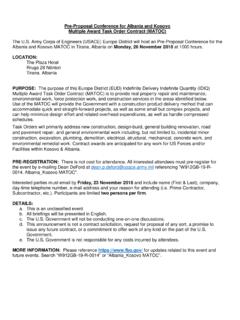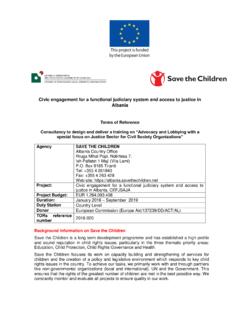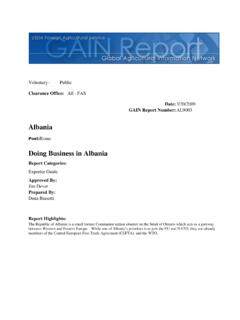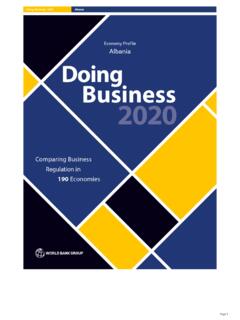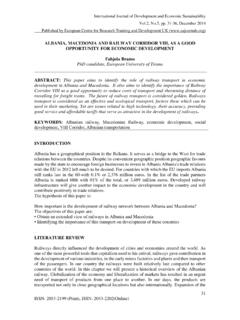Transcription of ALBANIA - irex.org
1 ALBANIAMEDIA SUSTAINABILITY INDEX2018 Tracking Development of Sustainable Independent Media Around the WorldALBANIAAT A GLANCEGENERAL Population: 3,047,987 (2017 est. CIA World Factbook) Capital city: Tirana Ethnic groups (% of population): Albanian , Greek , other 1% (including Vlach, Roma, Macedonian, Montenegrin, and Egyptian), unspecified (2011 est. CIA World Factbook) Religions (% of population): Muslim , Roman Catholic 10%, Orthodox , atheist , Bektashi (a Sufi order) , other , unspecified (2011 est., CIA World Factbook) Languages: Albanian (official), Greek , other (including Macedonian, Roma, Vlach, Turkish, Italian, and Serbo-Croatian), unspecified (2011 est. CIA World Factbook) GNI (2016-Atlas): $12 billion (World Bank Development Indicators, 2017) GNI per capita (2016-PPP): $11,350 (World Bank Development Indicators, 2017) Literacy rate: (2015 est.)
2 , CIA World Factbook) President or top authority: President Ilir Meta (since July 24, 2017)MEDIA-SPECIFIC Number of active print outlets, radio stations, television stations, Internet news portals: Print: 19 dailies (2017, Albanian Media Institute); Radio Stations: 1 national, 51 local, 4 community (2018, Audiovisual Media Authority), 1 public (in five channels), plus four local programs; TV Stations: 1 public (with 8 national channels), 5 national digital platforms and TV stations, 56 local TV stations, 2 satellite, 100 cable (2018, Audiovisual Media Authority); Internet News Portals: N/A Newspaper circulation statistics: N/A Broadcast ratings: N/A News agencies: Albanian Telegraphic Agency (state-run) Annual advertising revenue in media sector: 39 million (2017 est.
3 , Monitor magazine) Internet users: 2,016,516 (2016 est., CIA World Factbook)SCORE KEYU nsustainable, Anti-Free Press (0 1): Country does not meet or only minimally meets objectives. Government and laws actively hinder free media development, professionalism is low, and media-industry activity is Mixed System (1 2): Country minimally meets objectives, with segments of the legal system and government opposed to a free media system. Evident progress in free-press advocacy, increased professionalism, and new media businesses may be too recent to judge Sustainability (2 3): Country has progressed in meeting multiple objectives, with legal norms, professionalism, and the business environment supportive of independent media.
4 Advances have survived changes in government and have been codified in law and practice. However, more time may be needed to ensure that change is enduring and that increased professionalism and the media business environment are (3 4): Country has media that are considered generally professional, free, and sustainable, or to be approaching these objectives. Systems supporting independent media have survived multiple governments, economic fluctuations, and changes in public opinion or social for all years may be found online at PRESSUNSUSTAINABLEMIXED SYSTEMNEARSUSTAINABILITYSUSTAINABLEFREES PEECHPROFESSIONALJOURNALISMPLURALITY OFNEWS SOURCESBUSINESSMANAGEMENTSUPPORTINGINSTI TUTIONSMEDIA SUSTAINABILITY INDEX: general elections scheduled for June 2017, political crisis wracked ALBANIA during the first half of last year.
5 In February, lawmakers from the opposition Democratic Party walked out of the parliament and announced that they would boycott the election unless a technocratic administration replaced the Socialist Party government in the run-up to the vote. The Democrats, later joined by other opposition parties, claimed that the government has ties to organized crime and to a boom in illegal cannabis cultivation, and was incapable of overseeing free and fair elections. The government called the protests a pretext for stalling judicial reforms demanded by the European Union as part of ALBANIA s candidacy for a three-month stalemate, in May the parties reached an internationally mediated agreement that cleared the way for the vote to take place.
6 The balloting was postponed by a week, from June 18 to June 25, and the Democrats were given several ministerial posts, pending the election outcome. Opposition members returned to the parliament and legislative work resumed on creating vetting bodies for judges and other court staff. These steps were a key component of the reform process that has been a byword in Albanian politics since the country was granted EU candidate status in 2014. Lawmakers voted in members of the vetting institutions shortly before the election, in a move that EU leaders welcomed. The European Commission said that it was prepared to recommend that the union formally open accession talks with ALBANIA .
7 A decision is expected in June June 25 vote returned the Socialists and Prime Minister Edi Rama to power. With that overall majority, the party mandate has been extended from the 2013 election. Judicial reform remains a priority for Rama s second term, but political feuding quickly resumed after the election, and the opposition has announced a new wave of the political turmoil, the media situation in ALBANIA remained relatively stable. The overall MSI score inched down from to , but the panel found slight improvement in the areas of free speech, plurality of news sources, and supporting institutions. The lowered ratings for professional journalism and business management reflect an economic crisis in the industry, as major advertisers have steadily reduced media buys in recent years.
8 The resulting strain on media finances has led to cutbacks in newsrooms and has fostered self-censorship. Outlets have become more dependent on owners with distinct political and economic interests. Those owners hands were strengthened in 2017 with the implementation of court-mandated changes to media law that allow for greater concentration in the Albanian Compared to last year, the objectives related to free speech, plurality of news sources, and supporting institutions experienced a slight increase, while the opposite was true for the objectives of professional journalism and business management. Overall score continues to drop, albeit slightly, going from in 2017, to in 2018.
9 Economic crisis and management practices in Albanian media have had a heavy toll on finances and quality of reporting in media SUSTAINABILITY INDEX 20182 MEDIA SUSTAINABILITY INDEX 2018 ALBANIAOBJECTIVE 1: FREEDOM OF SPEECH s constitution and legislation guarantee freedom of speech and freedom of expression. The panel agreed that, in general, ALBANIA has a favorable legal environment for media freedom. They noted, however, shortcomings in implemen-tation of the laws, mainly from the judiciary. The legal framework of press protection has persistent gaps particularly in the area of defamation. Civil cases around defamation, which is not fully decriminalized, often result in punishing sanctions.
10 Civil sanctions are rather high, and while defamation cases have mainly been between politicians, rather than involving media, this creates problematic jurisprudence, said Darian Pavli, an attorney specializing in media and human-rights highest-profile case of the past year was filed by appeals court judge Gjin Gjoni and his wife. They sued news websites and (part of the regional network of the Balkan Investigative Reporting Network, or BIRN) and two journalists from each outlet. The cases, still ongoing at the time of this writing, involve articles about Gjoni s personal wealth and investigations of his finances.








